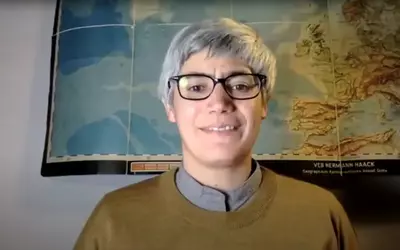
Kathryn Yusoff is a professor of inhuman geography at Queen Mary University, London
The study of the Earth’s rocks and natural resources is racist and linked to “white supremacy”, according to a geography professor at a leading UK university.
Kathryn Yusoff, an academic at Queen Mary University of London, said the hard science subject of geology was “riven by systemic racism” and colonialism.
She also suggested palaeontology, the study of prehistoric life through fossils, was partly to blame for racism, labelling it “pale-ontology”.
In her book, Geologic Life, the professor argued the extraction of gold, iron, and other metals was racist. She wrote that geology began as a “colonial practice” that created hierarchies, promoted materialism, destroyed environments and led to climate change.
‘Geotrauma’
The theft of land, mining and other geological aspects of colonialism led “toward the white supremacy of the planet” and resulted in “geotrauma”, Prof Yusoff wrote. She also claimed “geology continues to function within a white supremacist praxis”.Demands to decolonise courses, led by activist students and lecturers, have spread across UK universities, backed by official bodies such as the Quality Assurance Agency for higher education.
The agenda began in social sciences and humanities and is now being applied to hard science and maths subjects. It uses critical race theory to support the view that the knowledge studied in universities is male and white and has been used to attain and perpetuate Western global domination through racism and injustice.
Prof Yousoff’s book focused on geology from the 17th to the 19th century. She argued that non-white people have a closer relationship to the land than white people.
“Broadly, black, brown, and indigenous subjects… have an intimacy with the earth that is unknown to the structural position of whiteness,” she wrote.
Prof Yousoff described herself on the Queen Mary website as a professor of “inhuman geography”.
The study of rocks was also “racialised”, according to the academic.
“To tell a story of rocks is to account for a eugenic materialism in which white supremacy made surfaces built on racialised undergrounds…” she wrote.
Critics last night slammed the decolonisation agenda as “anti-scientific” and said the “exploitation” of the land was almost as old as mankind itself, and not race-dependent.
Dr John Armstrong, a reader in financial mathematics at King’s College London, said: “The programme of decolonisation is politically contentious, anti-scientific, and consistently associated with calls to lower academic standards.
“Many university departments have resisted the pressure to dumb-down and politicise their courses, but university leaders and their equality, diversity and inclusion (EDI) teams continue to demand that courses are decolonised.”
Chris McGovan, the chairman of the Campaign for Real Education, said: “Geology is no more racist than ‘fish ’n’ chips’! It is an entirely neutral term. Those seeking to decolonise the curriculum are, in fact, building their own sinister empire of thought-control and intolerance.
“Applied to exploitation it involves mining and this is almost as old as mankind and not race-dependent, as tourists are reminded when they visit our prehistoric flint mines such as Grime’s Graves, the English Heritage site in Norfolk.”
Article Link
Archive



